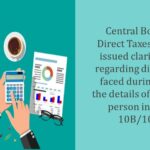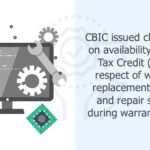Central Board of Direct Taxes (CBDT) has issued Circular No. 26/2019 dated 26th September, 2019 to provide further clarification in respect of filling-up of various ITR forms for the Assessment Year 2019-20.
Key points of the Circular are:
- It has been clarified that, in case shares have been acquired by the unlisted companies, other than start-ups, by way of transfer, and not by way of allotment made by the company, the details of shareholding should be entered in the respective columns of the Table in Schedule SH-l of ITR-6, as under-
- Name of Shareholder – Enter name of the person holding shares as on end of the previous year (current shareholder);
- Date of allotment – Enter date on which shares were transferred to the current shareholder as per companies register;
- Face value per share – Enter the face value per share at which the shares had been originally allotted by the company;
- Issue price per share – Enter the price at which shares were issued by the company to the original shareholder to whom the company had allotted the shares;
- Amount received – Enter the total amount received by the company from the original shareholder to whom the allotment of shares had been made, upto the end of the previous year.
- It has been clarified that, in case of start-ups, the details of shareholding are required to be furnished in Schedule SH-2. In cases where shares of a start-up company have been acquired by the shareholder by way of transfer, the details of shareholding should be entered in the respective column of the table in Schedule SH-2 of the ITR-6, as under-
- Name of Shareholder – Enter name of the person holding shares as on end of the previous year (current shareholder);
- Date of allotment – Enter date on which shares were transferred to the current shareholder as per companies register;
- Face value per share – Enter the face value per share at which the shares had been originally allotted by the company;
- Issue price per share – Enter the price at which shares were issued by the company to the original shareholder to whom the company had allotted the shares;
- Paid up value per share – Enter the amount received by the company for each share, from the original shareholder to whom the allotment of shares had been made, upto the end of the previous year;
- Share premium – Enter the amount of premium per share at which shares were allotted by the company to the original shareholder.
- It has been clarified that, PAN of shareholder should be furnished in Schedule SH-l of the ITR, if available. However, in case the shareholder is a non-resident, having no PAN or if PAN of the shareholder is not available due to any other reason, a default value can be entered in place of PAN such as “NORES9999N”.
- It has also been clarified that, an AOP, BOI is chargeable to tax at slab rate. However, while filing return of income in ITR-5, the departmental utility is charging tax at maximum marginal rate if the particulars of members of the AOP/BOI which are required to be furnished along with their respective shares are not provided or are incorrectly provided.
- It has been clarified that, an investment fund claiming exemption under Section 10(23FB) or 10(23FBA), or a business trust claiming exemption under Section 10(23FC) or 10(23FCA), is required to enter the amount of exempt income directly in column 12(b) or column 12(c), respectively, of the Part B – TI (computation of income) in the ITR-5. Such entities are not required to fill up the headwise details in Schedule BP, Schedule HP, Schedule CG, Schedule OS, and Schedule SI etc.
- It has been clarified that, for trust registered under Section 12A/12AA, in order to claim exemption of the amount received as corpus donotion while filing return of income in ITR-7, the trust is required to provide details in Part A – General, in the table “Details of registration or approval under the Income-Tax Act”, and enter ‘Section l2A/I2AA’ under the column “section under which registered or approved”. Further, in the column on filing status, the trust is required to choose “Section 11” in the drop-down provided against the field “please specify the section under which the exemption is claimed”.
- It is has been clarified that, in order to claim of exemption under Section 10 or Section 13A or Section 13B, the trust/ society/company should enter details directly in the relevant column of the Part B-TI (computation of income) in ITR-7. The income and expenditure statement should be furnished in the applicable Schedule i.e. Schedule IE-1 or IE-2 or IE-3 or IE-4.
- It has been clarified that, in ITR Form-2 and ITR Form-3, in Part-A General, at column (h), the taxpayers are required to state whether they were Director in a company at any time during the previous year and also disclose following information relating to each company in which he was a Director:-
(a) Name of Company ;
(b) PAN of Company ;
(c) Whether its shares are listed or unlisted ;
(d) Director Identification Number (DIN).
- It has been clarified that, a non-resident shall not be required to disclose details of his directorship in a foreign company, which does not have any income received in India, or accruing or arising in India. In other words, a non-resident taxpayer who is Director only in a foreign company, which does not have any income received in India, or accruing or arising in India, should not disclose details of such foreign company.
- It has been further clarified that, a non-resident taxpayer who is Director in a domestic company and also in a foreign company, which does not have any income received in India, or accruing or arising in India, should provide details of directorship in the domestic company only. It is also clarified that a resident taxpayer would continue to be required to disclose details of his directorship in any company, including foreign company, in the relevant column.
- It has been clarified that, a taxpayer, who is resident in India, and had at any time during the previous year-
(a) held, as beneficial owner, beneficiary or otherwise, any asset located outside India; or
(b) had signing authority in any account located outside India; or
(c) had income from any source outside India
Is required to up the information in Schedule FA in ITR Form-2, ITR Form-3, ITR Form-5, ITR Form-6 and ITR Form-7, in Part-B-TTI, before the verification part. In Schedule FA, the taxpayer is required to disclose the details of foreign assets etc. held at any time during the relevant accounting period.
- It has been clarified that, a taxpayer is required to file details in the Schedule FA, only if he has held foreign assets etc. at any time during the “previous year” (in India) as also at any time during the “relevant accounting period” (in the foreign tax jurisdiction).
For further details please refer the attached document.
Source: Central Board of Direct Taxes




